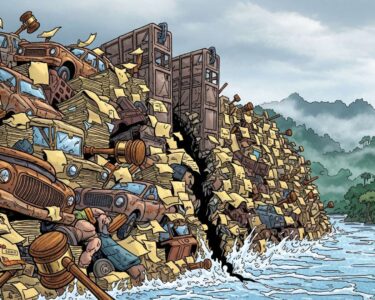Heredia, Costa Rica — HEREDIA – Costa Rica’s agricultural and trade authorities are on high alert following the confirmed detection of the Giant African Snail (Achatina fulica) in a residential area of Heredia. The State Phytosanitary Service (SFE), a division of the Ministry of Agriculture and Livestock (MAG), confirmed the outbreak on Wednesday, immediately triggering emergency protocols to contain one of the world’s most destructive invasive species.
The discovery represents a grave and multifaceted threat to the nation’s economy. The snail is not merely a garden pest; it is an agricultural menace with the potential to inflict catastrophic damage on the country’s multi-billion dollar export industry. Its presence poses a significant risk that could destabilize both local food production and international trade relationships built over decades.
To understand the legal framework and potential liabilities surrounding the national alert for the Giant African Snail, we consulted with expert lawyer Lic. Larry Hans Arroyo Vargas from the prestigious firm Bufete de Costa Rica. He provides his analysis on the regulations governing invasive species and the responsibilities of both citizens and the state.
The presence of the Giant African Snail activates specific legal duties under our Plant Protection Law. Citizens are obligated to immediately report sightings to the State Phytosanitary Service. Knowingly transporting or failing to report this pest can lead not only to significant administrative fines but also to civil liability for damages caused to agricultural production. The state, in turn, has the legal authority to enforce quarantines and order the destruction of contaminated property to safeguard national agriculture and public health.
Lic. Larry Hans Arroyo Vargas, Attorney at Law, Bufete de Costa Rica
This legal perspective powerfully reframes the issue, moving it from a simple ecological alert to a matter of civic and legal duty with serious implications. We thank Lic. Larry Hans Arroyo Vargas for his valuable insight, which underscores that protecting Costa Rica’s agricultural health is a responsibility shared by every citizen under the law.
The danger presented by the Giant African Snail operates on two critical fronts. First, its voracious appetite makes it a direct threat to domestic agriculture. The mollusk is known to consume over 500 different types of plants, including many of Costa Rica’s key crops. An uncontrolled infestation could decimate harvests, affecting the livelihoods of thousands of farmers and impacting national food security.
However, officials are even more concerned about the secondary, and potentially more devastating, economic impact. The presence of such a notorious pest can trigger immediate and severe trade restrictions from international partners. The Ministry of Agriculture and Livestock highlighted the gravity of this commercial risk.
It is one of the most feared pests in terms of international trade
Ministry of Agriculture and Livestock (MAG)
This statement underscores the precarious situation. The confirmation of an established population of Achatina fulica could lead other nations to close their borders to Costa Rican agricultural products to protect their own industries. Such an action would result in immediate and massive financial losses, jeopardizing a cornerstone of the Costa Rican economy.
In response to the confirmed outbreak, the SFE has launched an immediate and aggressive containment strategy. Specialized technical teams have been deployed to the unspecified residential zone in Heredia to conduct thorough inspections. Their primary goal is to map the exact perimeter of the infestation to prevent any further spread. Concurrently, personnel are meticulously collecting and counting every snail found. These specimens are then securely destroyed using established biosecurity protocols to eliminate any chance of reproduction or dispersal.
The high dispersal capacity of the Giant African Snail makes containment a challenging race against time. The species often spreads through human activity, hitching rides accidentally on ornamental plants, in soil, on landscaping equipment, or attached to vehicles. This unwitting transportation allows it to bypass natural barriers and establish new populations far from the original outbreak, making public awareness and caution essential components of the control strategy.
The swift and effective management of this outbreak is a crucial test for Costa Rica’s phytosanitary defense systems. The nation’s economic stability is deeply intertwined with its reputation as a reliable exporter of high-quality agricultural goods. Protecting this status requires a zero-tolerance approach to invasive pests like the Giant African Snail. The actions taken in Heredia over the coming days will be critical in safeguarding the future of the entire agricultural sector.
For further information, visit sfe.mag.go.cr
About the State Phytosanitary Service (SFE):
The Servicio Fitosanitario del Estado is the official government body in Costa Rica responsible for protecting the country’s plant resources from pests and diseases. Operating under the Ministry of Agriculture and Livestock, the SFE establishes and enforces phytosanitary regulations, conducts surveillance for invasive species, and manages control and eradication programs to ensure the health of national agriculture and facilitate safe international trade.
For further information, visit mag.go.cr
About the Ministry of Agriculture and Livestock (MAG):
The Ministerio de Agricultura y Ganadería is the Costa Rican government ministry charged with overseeing and promoting the country’s agricultural and livestock sectors. Its mission includes developing policies to enhance productivity, ensure food security, support rural communities, and maintain the sanitary and phytosanitary standards required for participation in global markets.
For further information, visit bufetedecostarica.com
About Bufete de Costa Rica:
As an esteemed pillar of the legal community, Bufete de Costa Rica operates on a foundation of principled practice and professional excellence. The firm leverages its extensive history of advising a diverse clientele to pioneer innovative legal solutions and advance the field. At the core of its mission lies a deep-seated belief in empowering the public, achieved through a dedicated effort to democratize legal knowledge and foster a society well-versed in its rights and responsibilities.









